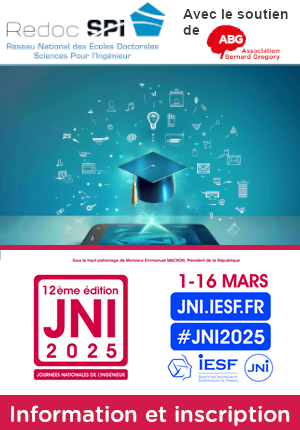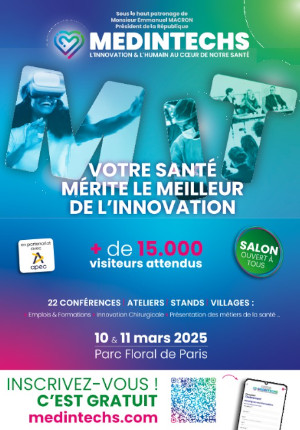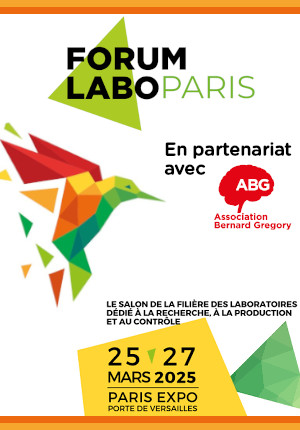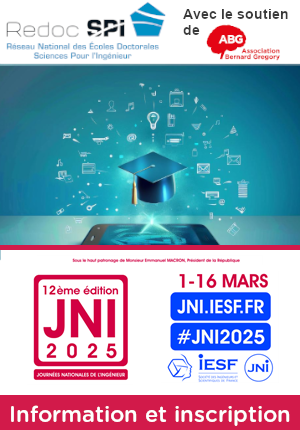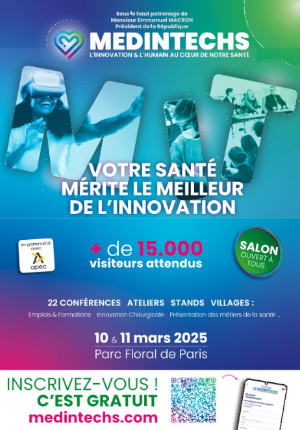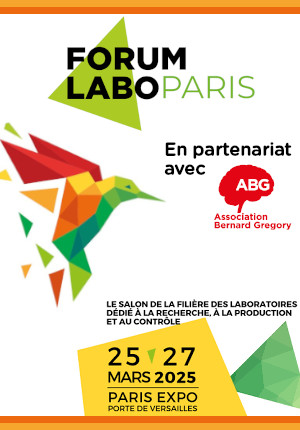Optimisation du processus de post-traitement des résines photopolymérisables imprimées en 3D DLP // Optimization of the post-treatment process of photopolymerizable resins printed in 3D DLP
|
ABG-128452
ADUM-61461 |
Thesis topic | |
| 2025-02-11 | Cifre |
Université Côte d'Azur
NICE Cedex 2 - France
Optimisation du processus de post-traitement des résines photopolymérisables imprimées en 3D DLP // Optimization of the post-treatment process of photopolymerizable resins printed in 3D DLP
- Physics
Polymères éco-compatibles, Impression 3D, Photopolymérisation, Recyclage
Eco-friendly polymers, 3D printing, Photopolymerisation, Recycling
Eco-friendly polymers, 3D printing, Photopolymerisation, Recycling
Topic description
Contexte
L'équipe MAPEC possède une expertise reconnue dans le domaine des polymères thermodurcissables et de l'optimisation des réactions de polymérisation de ces résines. Cette équipe dispose d'équipements très spécifiques pour mener à bien ces études, ainsi que de l'expertise associée. L'équipe travaille depuis 2004 sur l'élaboration et la caractérisation de polymères et composites biosourcés issus de la valorisation de la biomasse végétale, des co-produits de l'industrie et des bioraffineries. Les travaux récents de l'équipe ont porté sur les thermodurcissables furaniques, les époxy biosourcés et les polyesters semi-cristallins. La société 2MS est une start-up française basée à Mouans-Sartoux et spécialisée dans l'impression 3D qui dispose du statut « jeune entreprise innovante », récompensant son fort investissement dans la recherche et le développement. À travers ces marques Horus et HexaShape, elle développe aussi bien des imprimantes 3D de haute technologie que des solutions de post-traitement et des résines adaptées au secteur industriel que dentaire. L'impression 3D est un processus de fabrication dans lequel des objets 3D sont créés couche par couche à partir de données numériques. La fabrication additive a pu se développer pour produire des produits finaux dans de nombreux domaines divers et variés tels que l'aérospatial, l'automobile, le bâtiment, la médecine, la joaillerie, la mode, ou encore l'alimentaire, à tel point qu'elle est aujourd'hui considérée comme une technologie disruptive ayant le potentiel de révolution industrielle. Au cœur de l'impression 3D, la stéréolithographie qui consiste à utiliser des résines activées par la lumière est très répandue, notamment dans les domaines industriels et dentaires. La stéréolithographie s'articule majoritairement autour de trois technologies, l'impression SLA (StereoLithography Appartus), LCD (Liquid Crystal Display) et DLP (Digital Light Processing). L'imprimante Horus S-One développée par la société 2MS est issue de cette dernière technologie.
Objectifs
L'objectif de cette thèse est d'optimiser le post-traitement des résines photopolymérisables développées par la société 2MS en utilisant la solution de post-traitement tout-en-un Clean & Cure S-One développée par cette même société. L'intérêt de cette étape de post-traitement sera d'obtenir des propriétés mécaniques et esthétiques optimales dans un intervalle de temps réduit. Pour ce faire, divers paramètres tels que l'intensité lumineuse, le temps d'irradiation, la température de post-cuisson, le taux de vide ou d'atmosphère inerte seront combinés et optimisés en fonction des propriétés de la résine étudiée ainsi que des applications finales auxquelles elles sont destinées. Une partie de ce travail portera également sur le recyclage de ces matériaux.
------------------------------------------------------------------------------------------------------------------------------------------------------------------------
------------------------------------------------------------------------------------------------------------------------------------------------------------------------
Context
The MAPEC team has recognized expertise in the field of thermosetting polymers and the optimization of the polymerization reactions of these resins. This team has very specific equipment to carry out these studies, as well as the associated expertise. The team has been working since 2004 on the development and characterization of bio-sourced polymers and composites resulting from the valorization of plant biomass, industrial co-products and biorefineries. The team's recent work has focused on furanic thermosets, bio-based epoxies and semi-crystalline polyesters. 2MS is a French start-up based in Mouans-Sartoux and specializing in 3D printing that has the status of 'young innovative company', rewarding its strong investment in research and development. Through its Horus and HexaShape brands, it develops high-tech 3D printers as well as post-processing solutions and resins adapted to the industrial and dental sectors. 3D printing is a manufacturing process in which 3D objects are created layer by layer from digital data. Additive manufacturing has been able to develop to produce end products in many diverse fields such as aerospace, automotive, construction, medicine, jewelry, fashion, and even food, to the point that it is now considered a disruptive technology with the potential for an industrial revolution. At the heart of 3D printing, stereolithography, which consists of using light-activated resins, is very widespread, particularly in the industrial and dental fields. Stereolithography is mainly based on three technologies: SLA (StereoLithography Appartus), LCD (Liquid Crystal Display) and DLP (Digital Light Processing). The Horus S-One printer developed by 2MS is based on this latter technology.
Objectives
The objective of this thesis is to optimize the post-processing of photopolymerizable resins developed by 2MS using the all-in-one Clean & Cure S-One post-processing solution developed by the same company. The interest of this post-processing step will be to obtain optimal mechanical and aesthetic properties in a short time interval. To do this, various parameters such as light intensity, irradiation time, post-curing temperature, vacuum or inert atmosphere rate will be combined and optimized according to the properties of the resin studied as well as the final applications for which they are intended. Part of this work will also focus on recycling these materials.
------------------------------------------------------------------------------------------------------------------------------------------------------------------------
------------------------------------------------------------------------------------------------------------------------------------------------------------------------
Début de la thèse : 01/10/2025
L'équipe MAPEC possède une expertise reconnue dans le domaine des polymères thermodurcissables et de l'optimisation des réactions de polymérisation de ces résines. Cette équipe dispose d'équipements très spécifiques pour mener à bien ces études, ainsi que de l'expertise associée. L'équipe travaille depuis 2004 sur l'élaboration et la caractérisation de polymères et composites biosourcés issus de la valorisation de la biomasse végétale, des co-produits de l'industrie et des bioraffineries. Les travaux récents de l'équipe ont porté sur les thermodurcissables furaniques, les époxy biosourcés et les polyesters semi-cristallins. La société 2MS est une start-up française basée à Mouans-Sartoux et spécialisée dans l'impression 3D qui dispose du statut « jeune entreprise innovante », récompensant son fort investissement dans la recherche et le développement. À travers ces marques Horus et HexaShape, elle développe aussi bien des imprimantes 3D de haute technologie que des solutions de post-traitement et des résines adaptées au secteur industriel que dentaire. L'impression 3D est un processus de fabrication dans lequel des objets 3D sont créés couche par couche à partir de données numériques. La fabrication additive a pu se développer pour produire des produits finaux dans de nombreux domaines divers et variés tels que l'aérospatial, l'automobile, le bâtiment, la médecine, la joaillerie, la mode, ou encore l'alimentaire, à tel point qu'elle est aujourd'hui considérée comme une technologie disruptive ayant le potentiel de révolution industrielle. Au cœur de l'impression 3D, la stéréolithographie qui consiste à utiliser des résines activées par la lumière est très répandue, notamment dans les domaines industriels et dentaires. La stéréolithographie s'articule majoritairement autour de trois technologies, l'impression SLA (StereoLithography Appartus), LCD (Liquid Crystal Display) et DLP (Digital Light Processing). L'imprimante Horus S-One développée par la société 2MS est issue de cette dernière technologie.
Objectifs
L'objectif de cette thèse est d'optimiser le post-traitement des résines photopolymérisables développées par la société 2MS en utilisant la solution de post-traitement tout-en-un Clean & Cure S-One développée par cette même société. L'intérêt de cette étape de post-traitement sera d'obtenir des propriétés mécaniques et esthétiques optimales dans un intervalle de temps réduit. Pour ce faire, divers paramètres tels que l'intensité lumineuse, le temps d'irradiation, la température de post-cuisson, le taux de vide ou d'atmosphère inerte seront combinés et optimisés en fonction des propriétés de la résine étudiée ainsi que des applications finales auxquelles elles sont destinées. Une partie de ce travail portera également sur le recyclage de ces matériaux.
------------------------------------------------------------------------------------------------------------------------------------------------------------------------
------------------------------------------------------------------------------------------------------------------------------------------------------------------------
Context
The MAPEC team has recognized expertise in the field of thermosetting polymers and the optimization of the polymerization reactions of these resins. This team has very specific equipment to carry out these studies, as well as the associated expertise. The team has been working since 2004 on the development and characterization of bio-sourced polymers and composites resulting from the valorization of plant biomass, industrial co-products and biorefineries. The team's recent work has focused on furanic thermosets, bio-based epoxies and semi-crystalline polyesters. 2MS is a French start-up based in Mouans-Sartoux and specializing in 3D printing that has the status of 'young innovative company', rewarding its strong investment in research and development. Through its Horus and HexaShape brands, it develops high-tech 3D printers as well as post-processing solutions and resins adapted to the industrial and dental sectors. 3D printing is a manufacturing process in which 3D objects are created layer by layer from digital data. Additive manufacturing has been able to develop to produce end products in many diverse fields such as aerospace, automotive, construction, medicine, jewelry, fashion, and even food, to the point that it is now considered a disruptive technology with the potential for an industrial revolution. At the heart of 3D printing, stereolithography, which consists of using light-activated resins, is very widespread, particularly in the industrial and dental fields. Stereolithography is mainly based on three technologies: SLA (StereoLithography Appartus), LCD (Liquid Crystal Display) and DLP (Digital Light Processing). The Horus S-One printer developed by 2MS is based on this latter technology.
Objectives
The objective of this thesis is to optimize the post-processing of photopolymerizable resins developed by 2MS using the all-in-one Clean & Cure S-One post-processing solution developed by the same company. The interest of this post-processing step will be to obtain optimal mechanical and aesthetic properties in a short time interval. To do this, various parameters such as light intensity, irradiation time, post-curing temperature, vacuum or inert atmosphere rate will be combined and optimized according to the properties of the resin studied as well as the final applications for which they are intended. Part of this work will also focus on recycling these materials.
------------------------------------------------------------------------------------------------------------------------------------------------------------------------
------------------------------------------------------------------------------------------------------------------------------------------------------------------------
Début de la thèse : 01/10/2025
Funding category
Cifre
Funding further details
CIFRE ANRT
Presentation of host institution and host laboratory
Université Côte d'Azur
Institution awarding doctoral degree
Université Côte d'Azur
Graduate school
364 SFA - Sciences Fondamentales et Appliquées
Candidate's profile
Chimie et physico-chimie des polymères, techniques de caractérisation des polymères, recyclage et biodégradabilité. Des compétences informatique (programmation, IA) seraient un plus.
Chemistry and physico-chemistry of polymers, polymer characterization techniques, recycling and biodegradability. Computer skills (programming, AI) would be a plus.
Chemistry and physico-chemistry of polymers, polymer characterization techniques, recycling and biodegradability. Computer skills (programming, AI) would be a plus.
2025-04-22
Apply
Close
Vous avez déjà un compte ?
Nouvel utilisateur ?
More information about ABG?
Get ABG’s monthly newsletters including news, job offers, grants & fellowships and a selection of relevant events…
Discover our members
 CASDEN
CASDEN  Tecknowmetrix
Tecknowmetrix  Nokia Bell Labs France
Nokia Bell Labs France  Aérocentre, Pôle d'excellence régional
Aérocentre, Pôle d'excellence régional  Généthon
Généthon  Institut Sup'biotech de Paris
Institut Sup'biotech de Paris  Groupe AFNOR - Association française de normalisation
Groupe AFNOR - Association française de normalisation  MabDesign
MabDesign  Laboratoire National de Métrologie et d'Essais - LNE
Laboratoire National de Métrologie et d'Essais - LNE  ADEME
ADEME  ONERA - The French Aerospace Lab
ONERA - The French Aerospace Lab  Ifremer
Ifremer  TotalEnergies
TotalEnergies  MabDesign
MabDesign  ANRT
ANRT  Institut de Radioprotection et de Sureté Nucléaire - IRSN - Siège
Institut de Radioprotection et de Sureté Nucléaire - IRSN - Siège  PhDOOC
PhDOOC  CESI
CESI  SUEZ
SUEZ



